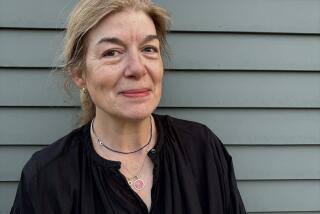Book review: ‘Charles Jessold, Considered as a Murderer’ by Wesley Stace
Charles Jessold, Considered as a Murderer
A Novel
Wesley Stace
Picador: 390 pp., $15 paper
In “Charles Jessold, Considered as a Murderer,” there is murder, but more important, there is the pretentious, erudite and dryly funny writer who tells us about it. In 1910, established music critic Leslie Shepherd befriends Charles Jessold, a young and promising composer. We know from the 1923 news clipping that kicks off the book what’s coming: Jessold kills his wife, her lover and himself, leaving an infant son orphaned. The murders happen on the eve of the premiere of Jessold’s first opera, the tragedy eerily mirroring the work’s end.
Set in England, Wesley Stace’s musically saturated novel jumps back to tell the story of Jessold as Shepherd knew him, in a (richly detailed) document written for the police after his death. They meet at a country house full of musical types visiting for the weekend. Shepherd swiftly notes Jessold’s physicality, describing “lucid emerald green” eyes and black hair “slicked lavishly with pomade”; it takes a few more pages to sort out that Leslie Shepherd is a man, and if there is a sensual element to his interest in Jessold, it is swiftly subsumed into the musical, the professional.
Early 20th century England was celebrating a rediscovery of its folk music, and Jessold and Shepherd, like the rest of their circle, set out to hunt folk songs like prey. They share taste and sensibility. Shepherd is impressed by Jessold’s transcription skills and his ability to compose work based on those songs. Jessold sees, in his older man, a patron, perhaps, or a needed advocate.
Their twinned ambitions fit each other — Jessold refines his musical skills and his career advances with Shepherd’s ongoing critical support. Shepherd is both champion and collaborator; he even pens the libretto for Jessold’s ill-fated opera. It’s this interdependence that makes this more than a fictional, opera-style “Behind the Music”: Shepherd is never merely an observer as Jessold gets sucked into the tug of alcohol and its attendant chaos.
Shepherd as witness wields elegant old-fashioned language and a sharp tongue. The language is intense, intelligent and allusive, witty if occasionally slow-going.
Shepherd is a traditionalist and British nationalist, a vocal opponent of the music coming from the European continent. This is Shepherd, on hearing Arnold Schoenberg: “His was the triumph of theory over practice, abstraction over depiction, of cold intellectual thought over the urge to give pleasure; it was the end of music as I could possibly know or describe it. To see this progression towards atrocity dramatised before me was too much. The last movement was inhumane, even to the very performers in front of our eyes. It was the murder of the human song.”
Shepherd’s anti-modernism causes a rift between him and Jessold. The younger man leaves to study in Germany, is caught by World War I, and returns changed. Their relationship is strained; although Shepherd will later provide the opera’s words, he doesn’t hear the music until the final dress rehearsal. He’s left so stunned that he can’t describe the opera. That night, he and his wife — Shepherd has a wife! — see a terribly drunk Jessold argue with his wife and her lover, and the tragic end arrives.
But we’re only halfway through the book; in part two, Shepherd’s previously marginal wife, Miriam, takes center stage. Moving back and forth through time, we learn about Shepherd’s tender feelings for Miriam and see scenes of their longtime marriage. Shepherd finds a nemesis in Daniel Banter, a rival folk music collector who pens a sensationalist book about Jessold, blighting whatever legacy he might have had.
By the close of World War II, Shepherd’s wife is dead. His career as a music critic is over: Like Beethoven, he had developed tinnitus, a ringing in the ears and hypersensitivity to sound. He’s secure financially, but craves contact — so when Jessold’s now-grown son suggests he write a corrective biography, Shepherd says yes.
This biography, such as it is, actually becomes Shepherd’s own memoir and in the book’s second half, he fills in things omitted in the first — about himself and Miriam, his career and the years that followed Jessold’s death — as well as something trickier: rewriting earlier scenes from a new perspective. Sometimes, when they are shown from a new angle, Miriam is revealed to have been standing just out of frame.
The book’s language has two different textures — all meat and no gristle in the first half, looser and smoother in the second, which is meant to have been written two decades later. This is just one of the ways that Wesley Stace, known to music fans as the singer-songwriter John Wesley Harding, demonstrates his mastery in this other medium.
Carefully plotted and brilliantly executed, the novel came from a true tale that Shepherd tells one the first weekend he met Jessold. That’s the story of Carlo Gesualdo, a 16th century Italian composer who murdered his wife and her lover, after perhaps setting them up. This awful story is echoed in a folk song Shepherd and Jessold hear; the same folk song becomes the basis for Jessold’s opera. In “Charles Jessold, Considered as a Murderer,” Shepherd outlines what seems to be an easily parsed tragedy, but it is a tragedy in which it becomes increasingly difficult to sort out who is hero, victim and villain in an echoing love triangle.
More to Read
Sign up for our Book Club newsletter
Get the latest news, events and more from the Los Angeles Times Book Club, and help us get L.A. reading and talking.
You may occasionally receive promotional content from the Los Angeles Times.







